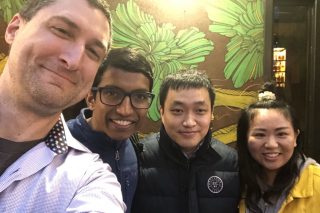From PhD Candidates to Professionals, ALERT Trio Continues to Collaborate
Ziyan Wu, Srikrishna Karanam, and Meng Zheng understand the importance of collaboration. The trio of research scientists currently comprise a small, but effective, team at United Imaging Intelligence (Cambridge, MA); however, their professional journey together began as ALERT student researchers many years earlier.
Under the guidance of ALERT researcher and Rensselaer Polytechnic Institute (RPI) professor, Richard Radke, the three completed their doctoral programs at RPI—both Wu and Karanam completed their Ph.D. studies in Computer and Systems Engineering in 2014 and 2017, respectively, and Zheng completed her Ph.D. study in Electrical Engineering in 2020.
Furthering transformational research and next-generation technologies to address explosives-related threats is central to ALERT’s mission, as is demonstrating meaningful impact through its education program, which is focused on developing a highly skilled workforce for the homeland security enterprise. ALERT’s education program has introduced and guided hundreds of student researchers and career professionals into the workforces of the Department of Homeland Security (DHS) and its stakeholders.
During their academic careers, Wu, Karanam, and Zheng worked closely with Radke, contributing to ALERT’s Human Detection Re-Identification for Mass Transit Environments research project, as well as the task order: Video Analytic Surveillance Transition (VAST), which involved the installation of a testbed in the Cleveland Hopkins International Airport (CLE). Following these two successful projects, they worked on the initial phase of Correlation of Luggage and Specific Passengers (CLASP), which leverages a realistic mock airport security checkpoint built in ALERT’s Video Analytics Laboratory at the Kostas Research Institute (KRI) for Homeland Security.
“The work I did for ALERT was important to my development as a researcher, because it was connected to a challenging real-world problem with critical security outcomes. For example, if the system misses one person going the wrong way in a security checkpoint, then this presents a serious security risk to the entire airport. Because of this, I learned to pay extra attention to algorithm and system design to ensure that there were no loopholes, which helped me develop good habits as a researcher,” said Wu.
“Instead of focusing on the performance of one fancy algorithm and whether it was meeting our performance goal on a particular benchmark dataset, we had to take a much more comprehensive viewpoint and consider how it would perform and serve stakeholders in a real-world scenario.”
[YouTube Video: “Real-Time Airport Security Checkpoint Surveillance Using a Camera Network”]
In partnership with other ALERT researchers at Boston University and Northeastern University, and working closely with industry experts at Siemens, Radke’s research team was instrumental in developing the infrastructure for these testbeds—setting up camera networks and data recording devices, building software architecture, and developing algorithms to track passengers as they moved through the airport security checkpoint. According to Karanam, the real-world experience of collaborating with industry and Transportation Security Administration (TSA) professionals was beneficial to their careers.
“The typical Ph.D. student is concerned with publishing papers and graduating ASAP. In our situation, we were motivated by a real-world problem, and we had to work with real-world customers, both of which formed the basis of our unique PhD experiences. We learned how to map out customer needs and requirements, translate them to specific research problems, build algorithms and technical solutions to address the problems, and then manage expectations and communicate results properly with customers, who might not be experts in our technical area—in this case, computer vision,” said Karanam.
“When I was interviewing for jobs, I could sense that the people on the other side of the table were very surprised to hear that I had worked and communicated directly with customers as a Ph.D. student—it was very advantageous.”
After Wu completed his Ph.D. in 2014, he was hired at Siemens. Following in his footsteps, Karanam completed an internship under Wu, and was also hired at Siemens post-graduation. When the two moved on to United Imaging Institute, they brought Zheng on as an intern, who joined the team officially upon completing her Ph.D. in 2020.
Zheng attributes her problem-solving skills, which serve her well in her current professional role, to her time as an ALERT student researcher: “It provided me with the opportunity to apply the theoretical to real-world problems, such as checkpoint security, and that really helped me develop strong problem-solving techniques. I don’t think most Ph.D. candidates have that opportunity. This was the most valuable part of the experience for me.”
Radke looks back on the careers of his three students with pride:
“One of the best parts of being a professor is seeing your students grow and become independent researchers. Ziyan, Srikrishna, and Meng were three of my best, and it has been deeply satisfying to watch them mentor each other and collaborate over the course of more than 10 years. Ziyan and I originally came up with the idea of simulating a security checkpoint on the RPI campus in 2010; Srikrishna helped design the CLASP testbed when it was just an empty room in 2016; Meng’s algorithms were some of the first we applied to the feeds from CLASP when it was up and running in 2017. Along the way, they published a ton of jointly authored papers, released several benchmark datasets and code libraries to help the community, and have gotten many computer vision algorithms developed in the lab to work robustly in real-world operational environments.”
The trio, which now spend their days developing computer vision algorithms for medical applications, acknowledge it is a bit unusual to continue working so closely together post-graduation, but they were inspired by their Ph.D. advisor and his outlook on collegiality.
“Professor Radke actively encouraged graduating students to continue collaborating with current students—this motivated the three of us to continue collaborating and it is a large part of why we still work together today,” said Karanam


There are currently no comments.
The comments are closed.